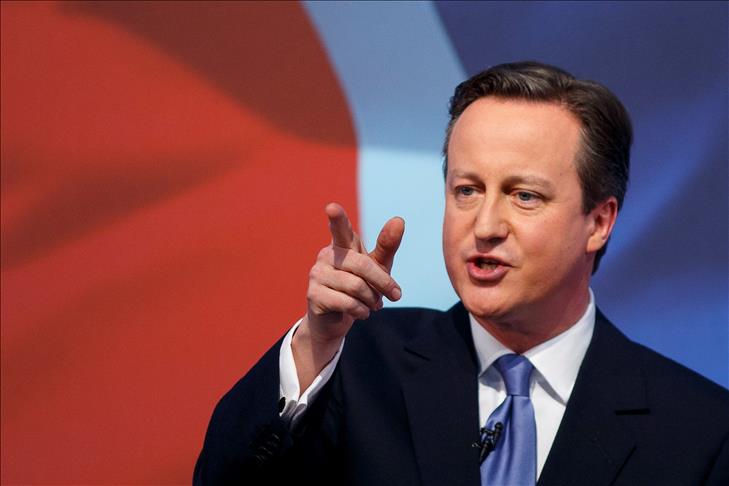
ANKARA
Prime Minister David Cameron on Friday pledged to introduce a system that would exclude non-English lawmakers from voting on solely English laws if his Conservative Party returns to power in next month’s general election.
The proposed policy, which Cameron promised to bring in within the first 100 days of the next parliament, is designed to tackle the “Lothian Question” that has bedeviled U.K. politics since 1977.
Often portrayed as “English votes for English laws,” the debate questions why parliamentarians from Scotland, Wales and Northern Ireland should be allowed to vote on English issues when English lawmakers in Westminster cannot vote on matters controlled by devolved assemblies in Edinburgh, Cardiff and Belfast.
The debate came to the fore again during last September’s referendum on Scottish independence. The Scottish National Party (SNP) failed to secure independence but won promises of further powers to be devolved to Scotland.
Cameron, whose center-right party leads a coalition government with the Liberal Democrats, unveiled the plan in the East Midlands city of Lincoln.
"If English MPs [Members of Parliament] do not have the right to vote on health and education in Scotland why should Scottish MPs have the right to determine what happens in English hospitals and English schools?” he asked.
"If you have basic constitutional unfairness like we've had, if you have the people in one part of the U.K. feeling like they are getting a raw deal, then resentment festers and that undermines the bonds and the fellow-feeling that are the basis of the United Kingdom."
Scottish Labour leader Jim Murphy was unconvinced by the plan. “You don’t defeat Scottish nationalism with David Cameron’s English nationalism,” he told a rally in Scotland.
SNP leader Nicola Sturgeon said her party would oppose any change.
“The problem is that many issues are characterized as English-only when they are anything but,” she said. “Votes on the English health service for example, which have a direct knock-on effect in Scotland. In those cases it is not only legitimate for Scottish MPs to vote but essential.”
Under the scheme, a new committee of English MPs would oversee legislation relating solely to England.
The pledge echoes comments made by Cameron following the Scottish referendum and could prevent Conservative voters defecting to the right wing U.K. Independence Party. It also emphasizes a potential coalition between Labour and the SNP, which polls predict could be the U.K.’s third largest party in the next parliament.
“This is not a vague promise to make this change some time in the future – this is a plan ready to be implemented,” House of Commons Leader William Hague said.
Included within Cameron’s package of “English laws” will be tax-raising powers. A commission set up after the Scottish referendum has granted the Scottish Assembly powers to set income tax levels and retain the revenue.
Cameron’s proposal includes an “English rate of income tax” that would also include tax in Wales and Northern Ireland.
"English MPs will be unable to vote on the income tax paid by people in Aberdeen and Edinburgh while Scottish MPs are able to vote on the tax you pay in Birmingham or Canterbury or Leeds,” Cameron said. “It is simply unfair. And with English votes for English laws we will put it right.”
Anadolu Agency website contains only a portion of the news stories offered to subscribers in the AA News Broadcasting System (HAS), and in summarized form. Please contact us for subscription options.


